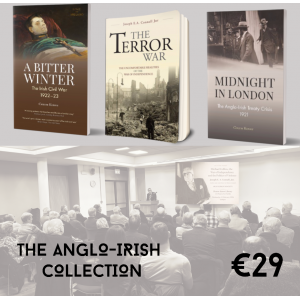THE TERROR WAR
MIDNIGHT IN LONDON
A BITTER WINTER
THE TERROR WAR
THE UNCOMFORTABLE REALITIES OF THE WAR OF INDEPENDENCE.
During the Irish War of Independence the British and the Irish sides often reflected one another. Both the Irish and the British did well in some areas, and were deficient in others. But both sides used terror – murder – burnings – shearing women’s hair – to intimidate the Irish population. British Field Marshal Henry Wilson said of the Black and Tans: ‘It was the business of the government to govern. If these men ought to be murdered, then the government ought to murder them.’ Michael Collins could equally chillingly say: ‘Careful application of terrorism is also an excellent form of total communication’. The actions of the British and Irish frequently mirrored one another – an uncomfortable reality of the War of Independence. This book examines the trauma of the times – both the exceptional and the ordinary – through a diverse range of topics.
Joseph Connell has had a lifelong interest in Irish history with particular emphasis on the period covered in this book. A lawyer and former instructor in the Californian Community College system, he spends his summers in Dublin, where he guides visitors on the 1916 Rebellion Walking Tour.
MIDNIGHT IN LONDON
On the dramatic night of 5-6 December 1921, Irish Delegates at Downing Street signed an agreement for a treaty to end the War of Independence and to create a new Irish state. This is the story of that fraught midnight deal, and of the events and people that lay behind it. The story is told from original sources and eyewitness accounts, and brings to life the Treaty that sparked a Civil War but made modern Ireland.
Irish negotiators were under great pressure, caught between an ultimatum from Prime Minister Lloyd George to sign or face outright war, and a refusal by the President of Dáil Éireann, Éamon de Valera, to lead them in London. For two months Arthur Griffith, Michael Collins and three other delegates faced some of the most powerful men in the British Empire, including Winston Churchill and Austen Chamberlain. Kenny turns a spotlight on the key issues and the problems they faced.
Dr Colum Kenny BL is Professor Emeritus, Dublin City University, a journalist and an honorary bencher of King’s Inns. Awarded the Irish Legal History Society’s Gold Medal, his books include histories of King’s Inns, an account of Irish emigration to the USA and, most recently, a biography of Arthur Griffith.
A BITTER WINTER
The Irish Civil War 1922-23.
In this challenging but fair account of the Irish Civil War, Colum Kenny sets out relevant tragic events of 1922 to 1923 in a clear and succinct way. He highlights in graphic detail the main moments of a war between former friends. Arguing that it is not possible to suspend judgement about a dispute that threatened the democratic foundation of the Irish state, and that gave solace to its enemies, he presents a balanced analysis of what happened during those two turbulent years.
Referring to activists on both sides such as Michael Collins, Harry Boland, Mary McSwiney and Richard Mulcahy, the author explains that the Civil War was bubbling from early 1922. Reflecting on the lasting bitterness engendered by civil war, a bitterness that broke Arthur Griffith’s heart and contributed to his early death in 1922, Kenny relates the Civil War to current tensions surrounding the future of Northern Ireland.
| Details | |
| Author | |
| Publisher | |
| Publication Data | |
THE ANGLO-IRISH COLLECTION
- ISBN: 978099
- Availability: In Stock
- €40.00
-
€29.00
Related Products
Who’s Who in the Dublin Rising 1916
At noon on Easter Monday, 24 April 1916, approximately 1000 men and women stormed buildings in centr..
€19.00


